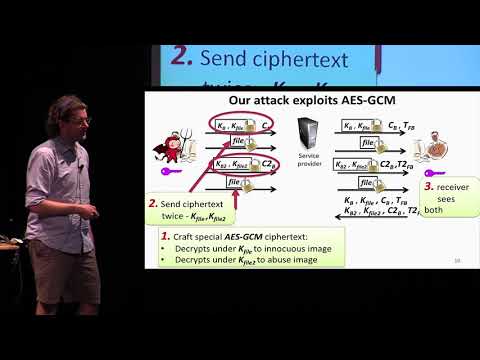CryptoDB
Fast Message Franking: From Invisible Salamanders to Encryptment
| Authors: | |
|---|---|
| Download: |
|
| Presentation: | Slides |
| Conference: | CRYPTO 2018 |
| Abstract: | Message franking enables cryptographically verifiable reporting of abusive messages in end-to-end encrypted messaging. Grubbs, Lu, and Ristenpart recently formalized the needed underlying primitive, what they call compactly committing authenticated encryption (AE), and analyze security of a number of approaches. But all known secure schemes are still slow compared to the fastest standard AE schemes. For this reason Facebook Messenger uses AES-GCM for franking of attachments such as images or videos.We show how to break Facebook’s attachment franking scheme: a malicious user can send an objectionable image to a recipient but that recipient cannot report it as abuse. The core problem stems from use of fast but non-committing AE, and so we build the fastest compactly committing AE schemes to date. To do so we introduce a new primitive, called encryptment, which captures the essential properties needed. We prove that, unfortunately, schemes with performance profile similar to AES-GCM won’t work. Instead, we show how to efficiently transform Merkle-Damgärd-style hash functions into secure encryptments, and how to efficiently build compactly committing AE from encryptment. Ultimately our main construction allows franking using just a single computation of SHA-256 or SHA-3. Encryptment proves useful for a variety of other applications, such as remotely keyed AE and concealments, and our results imply the first single-pass schemes in these settings as well. |
Video from CRYPTO 2018
BibTeX
@inproceedings{crypto-2018-28863,
title={Fast Message Franking: From Invisible Salamanders to Encryptment},
booktitle={Advances in Cryptology – CRYPTO 2018},
series={Lecture Notes in Computer Science},
publisher={Springer},
volume={10991},
pages={155-186},
doi={10.1007/978-3-319-96884-1_6},
author={Yevgeniy Dodis and Paul Grubbs and Thomas Ristenpart and Joanne Woodage},
year=2018
}

